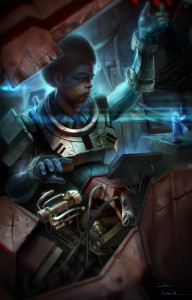
Recently, I read one of the most wonderful anecdotes I’d ever heard. Nichelle Nichols, who played Lt. Uhura on Star Trek, gave the keynote speech at Goddard’s 2012 Martin Luther King, Jr., and African-American History Month commemorative presentation. After Star Trek’s first season, she was set to leave. The stage was her first love and she wanted to pursue that instead of the television show. After confessing her feelings to Gene Roddenberry, he asked her to take the weekend to reconsider. That weekend she attended a NAACP fundraiser. During the event, she was asked if she would talk to a fan.
“I stood up and turned around, and looked into the beautiful face of Dr. Martin Luther King—my leader!” Nichols said. They discussed the cultural significance of Nichols’s role and her intent to depart television for the stage. She reflected on King’s response: “You cannot leave; you cannot abdicate,” he told her. “You don’t know what you mean to us. Every night that you’re on, we can look on and see what we’re fighting for.”
Her choice to remain created long-lasting ripples. Mae Jemison, a former NASA astronaut, cited Uhura as an inspiration for becoming an astronaut. Nichols’ work as a NASA recruiter also impacted the decisions of Sally Ride, Guion Bluford, Judith Resnik, and Ronald McNair. Whoopi Goldberg also points to Uhura as a turning point in her life, recalling that she ran through the house saying “I just saw a black woman on television; and she ain’t no maid!”
Without characters such as Uhura, we run into what Chimamanda Adichie calls “The Danger of One Story.” In her TED talk, the novelist discusses her childhood in Nigeria and recalls a number of instances where she or another found that their view of others was mistaken because they had only heard one story, one view of the others’ life. She starts with her experience reading foreign books as a young girl, how she came away with the belief that books had to have foreign characters and things she didn’t recognize from her own life. Until she discovered African literature, she did not realize that people like her could be characters in books.
